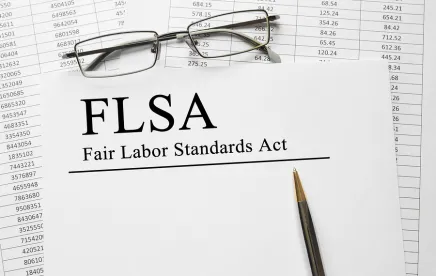After much anticipation, in early March 2019, the U.S. Department of Labor (DOL) finally announced a proposed rule that would change the minimum salary that white-collar employees must be paid to qualify as exempt from the overtime requirements under the Fair Labor Standards Act (FLSA). The proposed rule, if it takes effect, would raise the current minimum salary level for exempt employees from $455 per week or $23,660 annually to $679 per week or $35,308 annually. This is substantially less than the minimum level of $47,476 annually that was supposed to take effect back in 2016, but it still could have a significant impact on employers. In fact, the DOL estimates that over one million additional U.S. workers would be eligible for overtime if this proposed rule takes effect.
Under current DOL regulations, most white-collar employees – executives (supervisors), administrative employees and professionals – are exempt from the FLSA rules and need not be paid overtime for workweeks in which they work more than 40 hours if they satisfy the following two conditions: (1) they must perform what the DOL has defined as "exempt" duties; and (2) they must receive a guaranteed salary of at least $455 per week or approximately $23,660 annually. The proposed rule just announced by the DOL only changes the minimum salary requirement.
This highly-anticipated proposal comes just a little more than two years after a federal judge in Texas granted a nationwide injunction to prevent the DOL's 2016 salary threshold rule from taking effect. As noted above, the 2016 rule would have drastically changed the salary threshold by more than doubling it annually. Following the Texas court’s decision, the DOL collected comments and information from the public on changes to the salary requirements, in addition to holding several public feedback sessions across the nation to gather additional input, before developing this new proposal.
Key features of the new proposed rule are:
-
Raises the salary threshold necessary for a white-collar employee to qualify as exempt to $679 per week or $35,308 annually, which is set at the 20th percentile of weekly earnings for full-time salaried workers in the lowest income census region (currently the South);
-
Does not change the duties tests, which also must be met for a white-collar employee to qualify as exempt;
-
Provides that up to 10 percent of the standard salary level may come from non-discretionary bonuses and incentive payments (including commissions);
-
Raises the salary threshold necessary to qualify for the highly compensated employee exemption from $100,000 to $147,414 annually, which is the equivalent of the 90th percentile of full-time salaried workers nationwide; and
-
No automatic updates to the salary thresholds. Instead, the thresholds will be subject to periodic reviews, providing the public with notice and an opportunity to comment on any proposed changes before they are implemented.
It is important to note that this is only a proposal and any changes to the salary requirements for exempt employees would not take effect until a final rule is published. Currently, the DOL anticipates that the earliest possible date this proposed rule might take effect would be January 2020. For now, the DOL will welcome comments to the proposed rule until approximately the middle of May 2019.
In the meantime, employers should review their workforces to determine what changes, if any, may be necessary if the proposed rule becomes final. Possible considerations include raising the salary of employees who meet the duties test to at least $35,308 annually to retain their exempt status; converting employees to non-exempt status and paying the overtime premium of one-and-one half times the employees' regular pay rates for all overtime hours worked; or converting employees to non-exempt status and eliminating or reducing the amount of overtime hours worked by such employees.
Employers are encouraged to consult with legal counsel to discuss their options and strategies for implementing future changes, if necessary.




 />i
/>i

